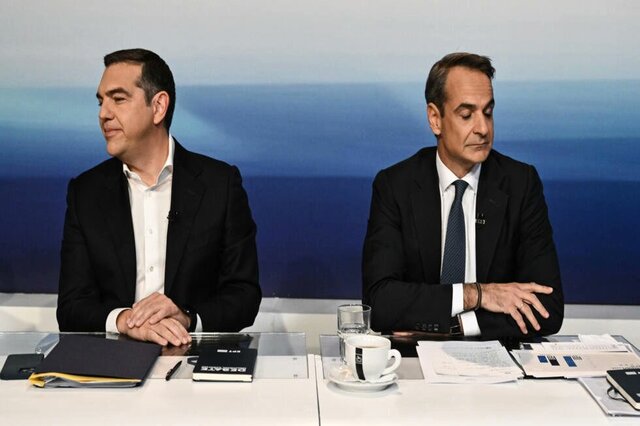Athens – Greece’s outgoing conservative Prime Minister Kyriakos Mitsotakis and leftist challenger Alexis Tsipras will make a final push for votes at closing rallies on Friday, ahead of the most uncertain general election in a decade.
Harvard graduate Mitsotakis has picked a spot beneath the imposing Acropolis in Athens to tout his record of steady growth, tax cuts and a post-pandemic tourism revival that has offered debt-ridden Greece a rare respite of economic stability.
Tsipras will meanwhile travel to the western port of Patras, Greece’s third largest city, to argue that the incumbent government had handed out billions of euros to political allies while Greeks are struggling with high inflation.
The two main rivals have travelled from island to border in recent weeks, giving daily speeches across the country for a vote that, because of a change in the electoral system, may require a follow-up – likely on July 2.
Greece holds national elections on Sunday and polls put Greek PM Kyriakos Mitsotakis and his New Democracy party ahead of rival former premier Alexis Tsipras and his Syriza party. But a change in the electoral system makes a rerun in the summer a highly likely outcome
— Paul Tugwell (@PaulTugwell1) May 19, 2023
Though current polls give the outgoing prime minister a clear lead of between five and seven percent, the rules for Sunday’s ballot set a high bar for an absolute majority that no party is likely to reach.
Mitsotakis has repeatedly urged voters not to squander away Greece’s economy gains, warning that failure to give his New Democracy party a strong mandate Sunday will lead to “paralysis” and “chaos” in the country amid geopolitical challenges like the Ukraine war or record inflation.
But Tsipras, a 48-year-old engineer who was prime minister from 2015 to 2019, has described Mitsotakis’s government as arrogant, heartless and unscrupulous.
The leftist, who led a rocky bailout negotiation in 2015 that nearly crashed Greece out of the euro, says the government’s political allies have gained most from Mitsotakis’s term.
He also points to a wiretap scandal that forced the resignations of the head of the intelligence service, and a nephew of Mitsotakis, who was a top aide in his office.
‘Government of the desperate’
Almost 10 million Greeks are eligible to cast ballots on Sunday. With nearly 440,000 Greeks as young as 16 voting for the first time, both leaders are aggressively courting the youth vote, which is heavily influenced by high unemployment.
While Greece posted growth of 5.9 percent in 2022, Tsipras has argued that the benefits were not trickling down to the population, with many workers still earning wages that have not kept pace with sharply rising costs.
He has therefore championed salary hikes that Mitsotakis say will cost over 80 billion euros – four times the estimate of Tsipras, who also argues that Greece could seek more financial aid at the EU level.
Rejecting accusations of fiscal irresponsibility, Tsipras told Ethnos.gr news portal on Thursday that on his watch, Greece “exited the bailout safely, we renegotiated the public debt and left 37 billion euros in state coffers”.
?? | Neste domingo (21/5) teremos eleições na Grécia. Um novo parlamento será eleito e elegerá um novo primeiro-ministro. O primeiro-ministro conservador Kyriakos Mitsotakis lidera as pesquisas, mas o partido de esquerda radical Syriza tem chances de voltar ao poder. Entenda ?? pic.twitter.com/eKGeyDECwR
— Eleições Europeias (@eleicoeseuropa) May 16, 2023
Mitsotakis meanwhile is championing the stability card.
Dismissing Tsipras’s backup plan to form a coalition with the Socialist Pasok-Kinal party as a “government of the desperate”, he said: “We want a stable government.”
“A government that can take decisions and will not be at the mercy of internal party bargaining and blackmail,” said the conservative leader, who has steadily led Tsipras in polls and has never lost an election against him at the national, local or European level.
Rage and justice
But adding to the mix of unpredictability is the impact on the vote of a deadly train crash in February.
Some 57 people – most of them university students – were killed in the train collision that was Greece’s worst rail disaster on record.
The tragedy sparked days of angry protests in which tens of thousands took part, and the government drew fire after initially trying to blame the accident exclusively on human error, when Greece’s notoriously poor rail network has suffered from years of under-investment.
First-time voter Kyriakos Papadopoulos, 19, an economy student said he will vote “for the candidate who I think is the best to improve the economic situation but with real effects on the society – that is, with real improvements on purchasing power, lower poverty and inequality rates”.
This week, a group representing the victims of the crash and their families filed a criminal lawsuit against Mitsotakis and current and former transport ministers and officials.
“I completely understand their rage and am the first who wants justice to be meted out at all levels,”
Mitsotakis told Antenna TV earlier this week.
Follow African Insider on Facebook, Twitter and Instagram
Source: AFP
Picture: Twitter/@eleicoseuropa
For more African news, visit Africaninsider.com


